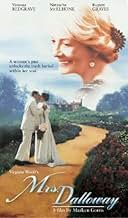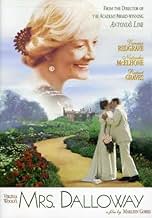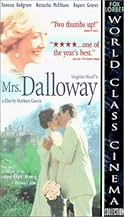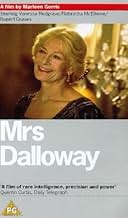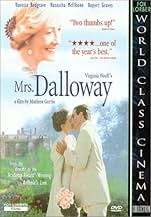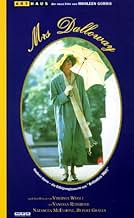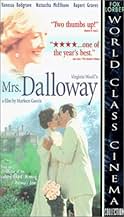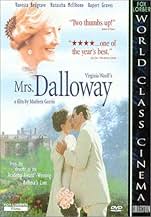CALIFICACIÓN DE IMDb
6.5/10
4.4 k
TU CALIFICACIÓN
En Londres, en 1923, la acomodada Clarissa Dalloway organiza al detalle una fiesta. El esplendor de esta es eclipsado por el regreso de un antiguo pretendiente al que hace más de 30 años que... Leer todoEn Londres, en 1923, la acomodada Clarissa Dalloway organiza al detalle una fiesta. El esplendor de esta es eclipsado por el regreso de un antiguo pretendiente al que hace más de 30 años que no ve.En Londres, en 1923, la acomodada Clarissa Dalloway organiza al detalle una fiesta. El esplendor de esta es eclipsado por el regreso de un antiguo pretendiente al que hace más de 30 años que no ve.
- Dirección
- Guionistas
- Elenco
- Premios
- 2 premios ganados y 1 nominación en total
- Dirección
- Guionistas
- Todo el elenco y el equipo
- Producción, taquilla y más en IMDbPro
Opiniones destacadas
While I agree with some of the more perceptive comments made here, I have a few of my own to add. First, the novel on which this film is based is an all-time favorite of mine and I'm happy to have seen it beautifully translated into cinematic form. The contrast between the personal and inner life of an upper class English woman and the horrors produced by war (in this case, symbolized through the experience of one man, brilliantly portrayed) is both moving and exacting. Vanessa Redgrave gives a splendid performance as Clarissa...sensitive, radiant, conservative and uncertain about life decisions as she looks back (nicely depicted in flashback). Michael Kitchen as her would-be lover of old is perfect for the role...quietly romantic, sexy, with just the right British propriety. The troubled young war veteran and his wife are well cast and Marleen Gorris should be credited with graceful directing.
Virginia Woolf is thought of as a high-brow rather than popular novelist yet the novel this film is based on sold well when first published in 1924. It is easy to see why there is nothing rarefied in the treatment of its themes, making choices and breaking with the past.
Clarissa Dalloway, a society matron, played with startled radiance by Vanessa Redgrave, is throwing a party and while making the arrangements she remembers back to the choice she made 30 years ago as a young woman between two men. One, Peter, charming, intelligent, adventurous, is the sort who went out and conquered India, or at least seduced the Major's wife. The other, Richard, good-looking, loving, a bit boofy, devoid of flair, is the sort that gravitates into politics. Naturally, the young Clarissa (played by Natasha Mc Elhone) has chosen the safe one, but Peter, after a chequered career, has turned up in London and pays her a call. She invites him to the party. Parallel to Clarisa's reminiscences is the story of Septimus (Rupert Graves) a returned soldier from World War I, whose wartime experiences are eating into his sanity.
Clarisa is put up as a `modern woman' who refuses Peter's love because she sees it as all demanding and all consuming, despite his attractive personality. Yet she accepts Richard, who wants and needs a dutiful, supportive wife. She also passes up the possibility of love with her close friend Sally. Though shaken when she hears of Stephen's fate from his psychiatrist, a guest at the party, and touched when she meets her old lovers again, she sees her life as going on before, safe and unexciting.
For a film-maker the amount of interior musing generated by Woolf's `stream of consciousness' writing technique presents a challenge and here Marleen Gorris has effectively used flashback to externalise Clarisa's memories. We get two stories artfully intercut, though there is not much tension in either of them - costumes, but not much drama. One does, however, get the feel of how it might have been to be in the upper class during the Edwardian late summer; as if just being there was enough (we even meet the Prime Minister at the party). Woolf and Gorris have evoked the atmosphere precisely, even if, as Lytton Strachey said, there isn't much of a plot. Even the minor characters sparkle. Robert Hardy as Sewell's psychiatist exudes bonhomie and guile, and Margaret Tyzak as the meddlesome Lady Bruton gives us a fine example of the old-fashioned female power broker at work. Overall, the film is rather slow, especially at the start, and I did wonder whether it would have been made without all the government and foundation money listed in the credits, but the quality of the performances redeem it to some extent.
Clarissa Dalloway, a society matron, played with startled radiance by Vanessa Redgrave, is throwing a party and while making the arrangements she remembers back to the choice she made 30 years ago as a young woman between two men. One, Peter, charming, intelligent, adventurous, is the sort who went out and conquered India, or at least seduced the Major's wife. The other, Richard, good-looking, loving, a bit boofy, devoid of flair, is the sort that gravitates into politics. Naturally, the young Clarissa (played by Natasha Mc Elhone) has chosen the safe one, but Peter, after a chequered career, has turned up in London and pays her a call. She invites him to the party. Parallel to Clarisa's reminiscences is the story of Septimus (Rupert Graves) a returned soldier from World War I, whose wartime experiences are eating into his sanity.
Clarisa is put up as a `modern woman' who refuses Peter's love because she sees it as all demanding and all consuming, despite his attractive personality. Yet she accepts Richard, who wants and needs a dutiful, supportive wife. She also passes up the possibility of love with her close friend Sally. Though shaken when she hears of Stephen's fate from his psychiatrist, a guest at the party, and touched when she meets her old lovers again, she sees her life as going on before, safe and unexciting.
For a film-maker the amount of interior musing generated by Woolf's `stream of consciousness' writing technique presents a challenge and here Marleen Gorris has effectively used flashback to externalise Clarisa's memories. We get two stories artfully intercut, though there is not much tension in either of them - costumes, but not much drama. One does, however, get the feel of how it might have been to be in the upper class during the Edwardian late summer; as if just being there was enough (we even meet the Prime Minister at the party). Woolf and Gorris have evoked the atmosphere precisely, even if, as Lytton Strachey said, there isn't much of a plot. Even the minor characters sparkle. Robert Hardy as Sewell's psychiatist exudes bonhomie and guile, and Margaret Tyzak as the meddlesome Lady Bruton gives us a fine example of the old-fashioned female power broker at work. Overall, the film is rather slow, especially at the start, and I did wonder whether it would have been made without all the government and foundation money listed in the credits, but the quality of the performances redeem it to some extent.
I appreciate this film for its technical quality, as well as its ambition in trying to film a novel that is written in the stream of consciousness style, however it fails overall because of Ms. Redgrave's performance. Her acting destroys the tone of the movie in a extremely jarring way; the contrast between her just-swallowed-a-bottle-of-Prozac happiness and the other plot lines and draws the viewer out of the experience of the film. The novel's tone is much darker and Clarissa's point-of- view much more based on regret, and more in sync with the post-traumatic-stress and depression of Septimus and the ennui and disenfranchisement of her daughter. Her performance wasn't only in the wrong tone, but it was incredibly phony; a viewer should never see acting happening. This is the same gripe I have with Rupert Grave's performance of Septimus; his acting is too stagy and I never truly believed him when shouting "EVANS! EVANS!"
Probably will be (and perhaps should be) the last time a film adaptation is made of this novel.
Probably will be (and perhaps should be) the last time a film adaptation is made of this novel.
In 1923 London, socialite Clarissa Dalloway (Vanessa Redgrave) is planning a high class party. She is the wife of MP Richard Dalloway. Her daughter Elizabeth prefers do-gooder Miss Kilman than her. Her old suitor Peter Walsh arrives with a troubled love life and various failures. Meanwhile, former soldier Septimus Warren Smith (Rupert Graves) is haunted by the nightmarish Great War. His wife Rezia is concerned. The movie also flashbacks to a young Clarissa (Natascha McElhone), a young Peter, and best friend Sally (Lena Headey).
This is adapted from a Virginia Woolf novel. The Septimus side of the story is separated from Clarissa for most of the movie. That kept me at an arm's length as I waited for the two sides to come together. While interested in Septimus, it seems to repeat the same premise. He would be better to be in his own movie about a shell shocked veteran. When the sides finally collide, it's not as compelling as one wish. Of course, it's still interesting as a character study for Clarissa. It may work better in literary form. As for young Clarissa, I'm more interested in Sally than Peter. It may be salacious but that counts. Vanessa Redgrave is able to maintain interest for the most part. I can't say that this is exciting or thrilling in any way. She's a marginally interesting character.
This is adapted from a Virginia Woolf novel. The Septimus side of the story is separated from Clarissa for most of the movie. That kept me at an arm's length as I waited for the two sides to come together. While interested in Septimus, it seems to repeat the same premise. He would be better to be in his own movie about a shell shocked veteran. When the sides finally collide, it's not as compelling as one wish. Of course, it's still interesting as a character study for Clarissa. It may work better in literary form. As for young Clarissa, I'm more interested in Sally than Peter. It may be salacious but that counts. Vanessa Redgrave is able to maintain interest for the most part. I can't say that this is exciting or thrilling in any way. She's a marginally interesting character.
10anelson1
Everyone doesn't like everything, so I'm not surprised that some people find the movie of Mrs. Dalloway boring. They probably would find the book boring too. But it's depressing. So they won't agree with some of us who see the novel as one of the great works of the 20th century, and the film as a truly remarkable and beautiful capturing of it. The only touch I regretted was the opening of the film with the Septimus Warren-Smith war scenes. The opening really belongs with Mrs. D. and her first words, "I will buy the flowers myself." After that moment, it's a quiet day but a beautiful and sensitive one.
¿Sabías que…?
- TriviaFirst screenplay written by Eileen Atkins.
- ErroresIn the flashback scenes with the younger actors, Peter is slightly taller than Clarissa. When they dance together at the party, he is considerably shorter than her.
- Citas
Peter Walsh: [Talking about Clarissa in 1923] She broke my heart, and you can't love like that twice.
- Bandas sonorasTime for Old Time
Composed by Jack Trombey (as J. Trombey)
Selecciones populares
Inicia sesión para calificar y agrega a la lista de videos para obtener recomendaciones personalizadas
- How long is Mrs Dalloway?Con tecnología de Alexa
Detalles
- Fecha de lanzamiento
- Países de origen
- Idioma
- También se conoce como
- Virginia Woolf's Mrs Dalloway
- Locaciones de filmación
- Duke of York Column, St James's, Londres, Inglaterra, Reino Unido(Mrs Dalloway coming back from shopping flowers)
- Productoras
- Ver más créditos de la compañía en IMDbPro
Taquilla
- Total en EE. UU. y Canadá
- USD 3,309,421
- Fin de semana de estreno en EE. UU. y Canadá
- USD 90,127
- 22 feb 1998
- Total a nivel mundial
- USD 3,309,421
- Tiempo de ejecución1 hora 37 minutos
- Color
- Mezcla de sonido
- Relación de aspecto
- 1.85 : 1
Contribuir a esta página
Sugiere una edición o agrega el contenido que falta

Principales brechas de datos
By what name was Mrs Dalloway (1997) officially released in India in English?
Responda

